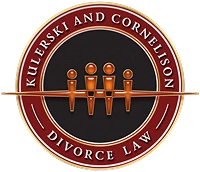When navigating divorce, child custody, or other family law matters in Illinois, one of the most important decisions you will face is choosing between mediation and litigation. Both approaches aim to resolve disputes, but they differ significantly in cost, time, emotional impact, and control over outcomes. Understanding the pros and cons of each can help you make an informed decision that aligns with your goals and circumstances.
At Kulerski & Cornelison, our team serves families DuPage and Cook counties. We understand the benefits of resolution while standing ready to litigate issues on your behalf.
What Is Mediation?
Mediation is a voluntary process where a neutral third party, called a mediator, helps both sides reach a mutually agreeable resolution. In Illinois, mediation is often required in family law cases involving child custody or parenting time disputes.
The mediator does not make decisions but facilitates communication and compromise.
What Is Litigation?
Litigation involves taking your case to court, where a judge hears arguments from both parties and issues legally binding decisions. Each party is typically represented by an attorney, and the process follows formal rules of evidence and procedure.
Litigation is adversarial by nature and often used when parties cannot reach agreement through negotiation or mediation.
Pros of Mediation
1. Cost-Effective
Mediation is generally less expensive than litigation. It avoids court filing fees, multiple attorney appearances, and prolonged legal battles. Many Illinois families choose mediation to reduce financial strain during divorce or custody disputes.
2. Faster Resolution
Mediation can resolve issues in weeks or months, while litigation may take a year or more. Scheduling is more flexible, and parties can move at their own pace.
3. Confidentiality
Unlike court proceedings, mediation is private. Discussions and agreements are not part of the public record, which helps protect sensitive family matters.
4. Greater Control
In mediation, both parties craft their own agreement. This allows for customized solutions that reflect each family’s unique needs, especially in parenting plans and asset division.
5. Less Adversarial
Mediation promotes cooperation and communication. It is especially beneficial when children are involved, as it helps preserve co-parenting relationships and reduces emotional stress.
Cons of Mediation
1. Requires Willing Participation
Mediation only works if both parties are willing to negotiate in good faith. If one party is uncooperative or manipulative, mediation may fail.
2. No Guaranteed Resolution
If parties cannot reach agreement, mediation ends without a binding decision. You may still need to go to court, adding time and cost.
3. Limited Legal Protections
Mediators do not offer legal advice. Without attorney guidance, parties may agree to terms that are unfair or unenforceable.
4. Not Suitable for High-Conflict Cases
In cases involving domestic violence, substance abuse, or severe power imbalances, mediation may not be appropriate or safe.
Pros of Litigation
1. Legally Binding Decisions
Litigation results in enforceable court orders. This is crucial when parties cannot agree or when one side refuses to comply voluntarily.
2. Legal Representation
Each party has an attorney to advocate for their interests, ensuring that rights are protected and legal standards are met.
3. Structured Process
Litigation follows formal procedures, which can be helpful in complex cases involving financial disclosures, contested custody, or property disputes.
4. Appropriate for High-Conflict Situations
When cooperation is impossible or safety is a concern, litigation provides a structured, impartial forum for resolution.
Cons of Litigation
1. Expensive
Court fees, attorney costs, and expert witnesses can make litigation financially burdensome, especially in prolonged cases.
2. Time-Consuming

Illinois family law cases can take months or years to resolve in court. Delays are common due to crowded dockets and procedural requirements.
3. Public Record
Court proceedings are public, which means sensitive family details may be accessible to others.
4. Loss of Control
A judge makes final decisions, which may not reflect your preferences or family dynamics. Outcomes can feel impersonal or unpredictable.
Use Every Tool at Your Disposal with a Skilled Illinois Family Lawyer
Choosing between mediation and litigation in Illinois family law depends on your specific situation. Mediation offers a collaborative, cost-effective path for resolving disputes, while litigation provides structure and enforceability when cooperation breaks down. If you are unsure which route to take, consult a qualified Illinois family law attorney to evaluate your options and protect your interests.
At Kulerski & Cornelison, our family law attorneys are ready to help. Contact us today for a consultation of your case.
